Estate planning attorneys are in a very competitive market, meaning that attracting clients can be challenging. Therefore, developing and executing a marketing strategy through tactics that drive new clients is critical to your firm’s growth and success.
In this article, we’ll look at our top marketing ideas for estate planning attorneys that are proven to generate more leads and sign up more clients.
Use any combination of these tactics to grow traffic. Many of the tactics listed can create synergies with other ideas, since using them in concert will be more effective as a whole then if you used them separately.
10 Marketing Ideas for Estate Planning Attorneys
Looking for ways to attract more clients and grow your law firm? Here are 10 marketing ideas for estate planning attorneys:
- Optimize Your Conversion Rate
- Showcase Reviews and Social Proof
- Publish Relevant Blog Content
- Get Organic Traffic with SEO
- Use a Lead Magnet to Get New Clients
- Nurture Leads with Email Marketing
- Post Often on Social Media
- Answer Client FAQs in Videos
- Use PPC Ads to Get More Clients Quickly
- Improve Your Client Experience
1. Optimize Your Conversion Rate
Your website is a powerful marketing tool and one of your business’ core promotional assets.

Making your website more user-friendly, professional and authoritative will encourage your visitors and prospective clients to get in touch with you. Use custom photography of yourself and your legal team on the website to build trust and develop a deeper connection with your site visitors.
Invest in a professional web design for your estate planning law firm that integrates with your brand and messaging. You can do it yourself if you’re willing to take the time to plan, design and build a site filled with rich content and is easy for potential clients to navigate. You can also hire a professional law firm marketing agency to handle this for you and get it done the right way, the first time.
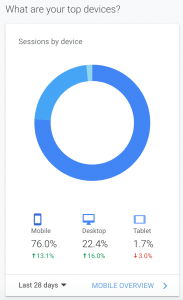
Make sure that your website is properly optimized for mobile users. 50% or more of your users are likely going to come from mobile and it’s imperative that your site prioritizes this segment of your web traffic.
Use call to action elements on your website that adapt based on whether someone visits using a mobile or desktop browser.

For instance, we add a custom touch-enabled sticky bar to our law firm websites for users on mobile phones so they can either send a message quickly or tap a button to initiate a phone call. This drives a lot of new calls and emails for lawyers we work with.
2. Showcase Reviews & Social Proof
Reviews and social proof are key ingredients to boosting your firm’s credibility in the modern age with online marketing for estate planning lawyers. You can add reviews manually to your website or install a plugin that automatically grabs them from Google, Facebook and other online sources.
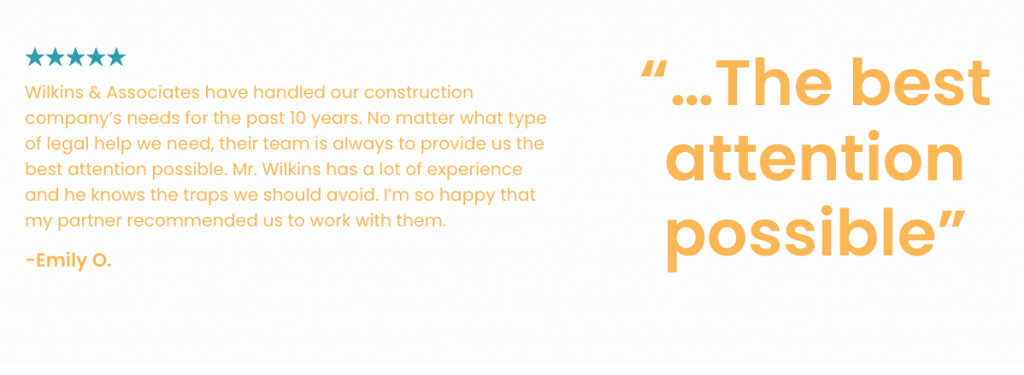
Dedicate a page on your website strictly to reviews. Additionally, we recommend thoughtfully placing reviews on high traffic pages of your website, such as the home page and service pages.
The location where you position reviews should be clearly visible to visitors so that they’re most likely to come across it early on the page, giving them more confidence to call or email your firm.
3. Publish Relevant Blog Content
Content is becoming an increasingly important part of online marketing for law firms. Your firm can benefit from publishing content that is relevant to your clients.
There are a few tricks to doing it the right way, however.
Make sure that you only write content that is helpful to your audience. Refrain from writing content that interests you. It won’t help your business if it doesn’t help your target clients or an audience that will refer clients to you.
For estate planning, write about topics that answer questions and address concerns regarding wills, property, probate, estate taxes and trusts.
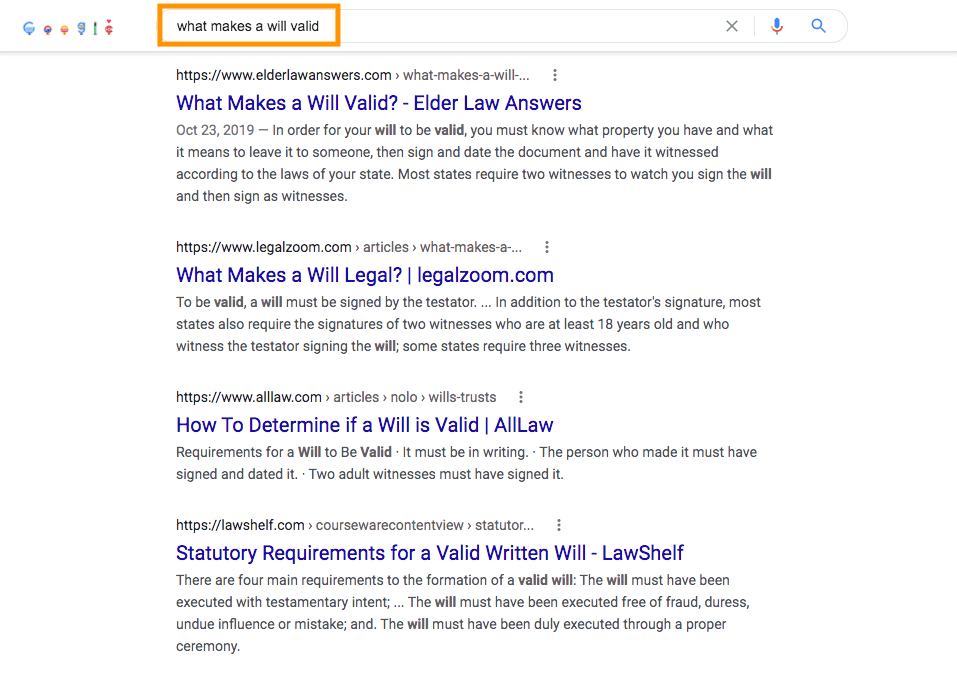
Research and make a list of questions that consumers have about planning their estate and asset protection and address those questions and topics through your blog posts and web pages. Make blog articles that you write specific to a question or specific issue and answer it thoroughly.
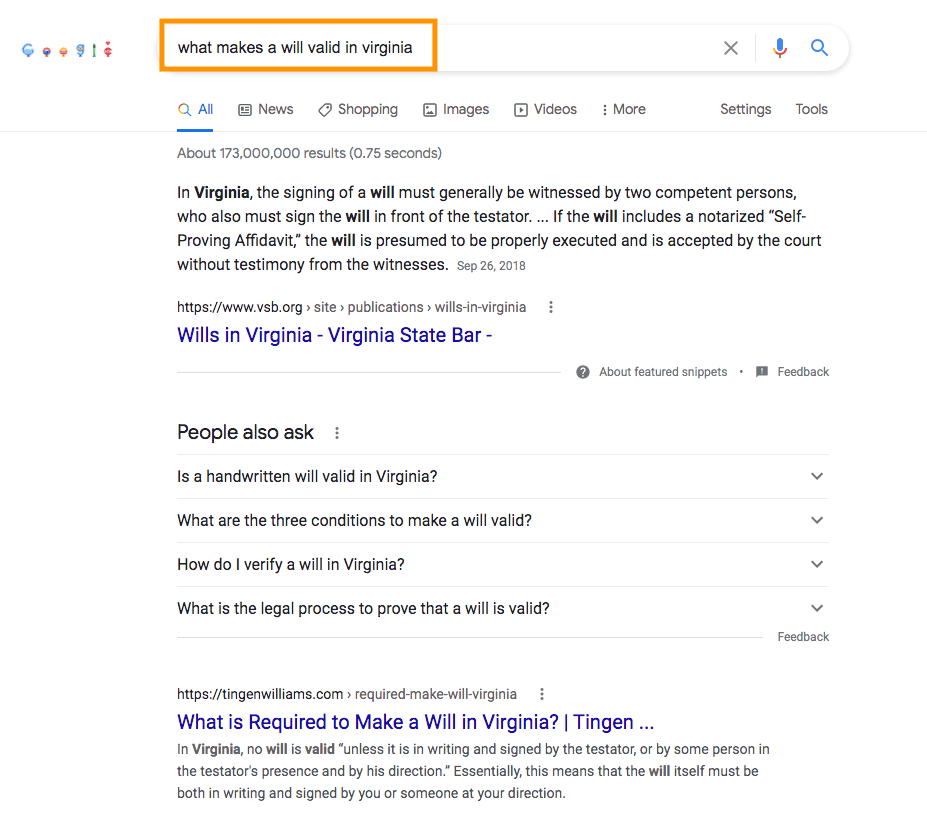
The second important key to writing relevant blogs is to focus it on your target market. Many of these questions and searches are specific to your state. So make sure to focus on only writing blogs that answer questions related to your state or local target market. We’ve seen clients that were writing blogs that targeted traffic nationally. Only a small percentage of it ever converted, because while they were in a large state, only a small portion of traffic was coming from their home state. This is a critical mistake to avoid.
4. Get Organic Traffic with SEO
As we’ve discussed already, your website’s visitors can make up a large portion of your clientbase. An excellent channel to develop and grow your web traffic is through organic search traffic.
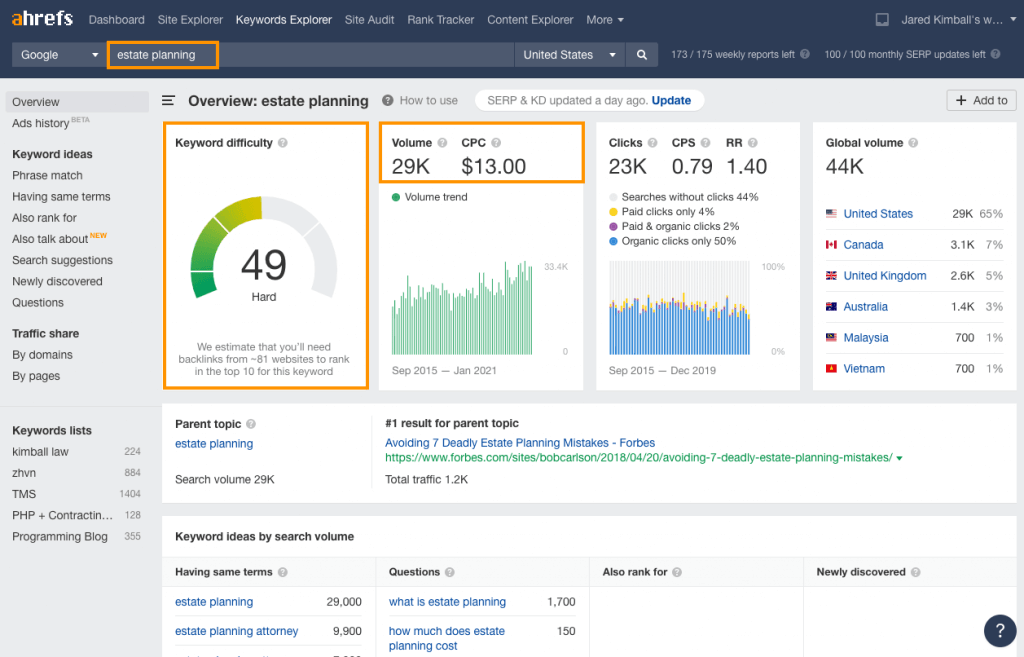
The process of growing your organic search visitors is called SEO (Search Engine Optimization) and it can be one of your primary (if not the main) channel for new clients and business.
Having your website and content optimized for search engines will get you ranking higher for search queries, like these estate planning keywords, which in turn will bring you more traffic that will convert into leads – keeping you and your staff busy with new business.
5. Use a Lead Magnet to Get New Clients
Lead magnets are a powerful way to attract new potential clients. These are highly effective in the upper parts of the funnel, where people are conducting research on estate planning, interested in having it done soon or it’s at the back of their mind, but aren’t fully prepared to pull the trigger and contact a lawyer just yet.

This is where a lead magnet can build you an incredible source of leads and new business. You can create a lead magnet by creating a free resource, such as an evergreen video webinar or an eBook packed with tips and important information for estate planning.
They receive private access to the lead magnet via email which in turn means that you can add them to your email list.
6. Nurture Leads with Email Marketing
We just explained how a lead magnet can be used to build your law firm’s email list. You can also build your email list from the contacts you already have, from business partners, other lawyers in your area as well as past and existing clients.
However, what do you do once you have your email list?
It’s time to nurture your contacts to harvest new business from it.
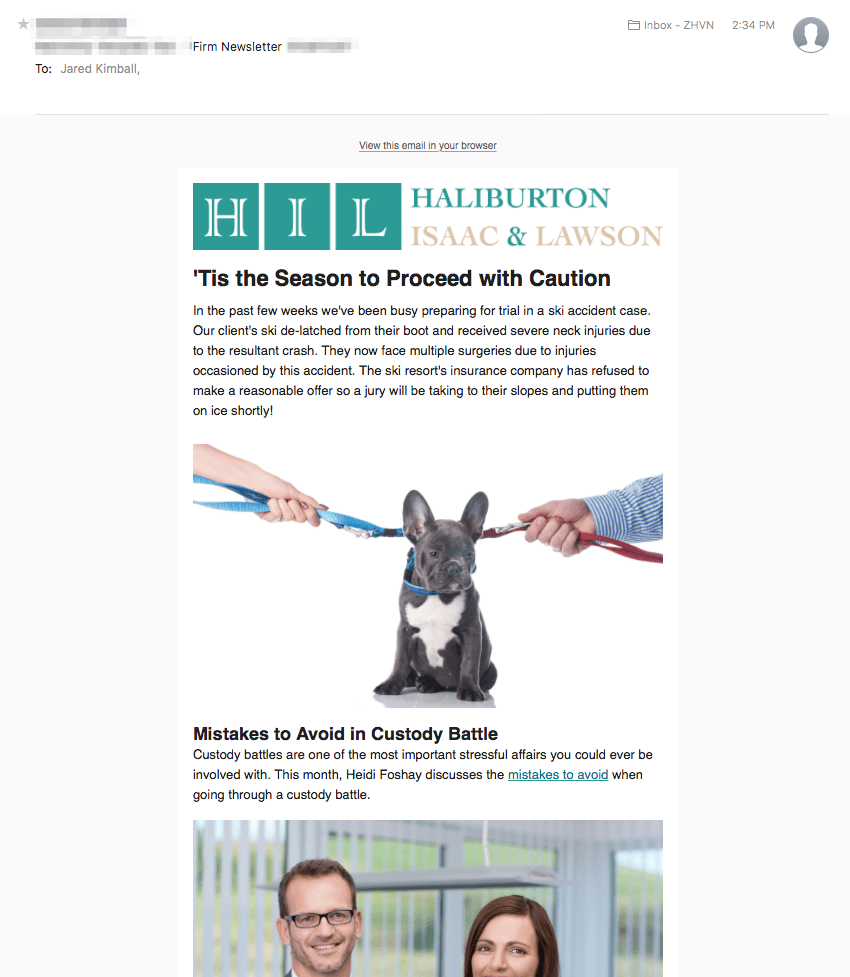
Send out a monthly newsletter to keep in touch with your contacts and stay top of mind. This one tactic alone can boost the number of referrals you receive for wills and estate matters.
You can take it further by turning into a digest, where you highlight new articles you’ve published on your blog, stories of past clients to highlight successes or problems as a result of properly or improperly getting their affairs in order and provide exclusive tips.
7. Post Often on Social Media
Social media is a marketing channel that I continually hear from our prospective clients that they’re trying to incorporate into their client acquisition strategy.
Many of them have an idea of what a solid social media marketing plan would look like, but aren’t sure how to implement it or use social networking sites correctly.
Use your social media accounts to post and share information and tips about the benefits and things to consider related to estate planning as well as sharing testimonials and stories about past client successes.
When it comes to building a strong, ongoing social media campaign, you should choose whether to post it through your personal or business profile.
Personal profiles have several advantages over business profiles. This includes having greater reach, as social networking algorithms are designed to limit how many people see posts from a business page, forcing you to pay to further promote your content. Personal profiles are also beneficial since they develop a more personal connection with your audience, since your audience is engaging with a post from a person rather than a business.
Business profiles have the advantages of being more easily managed by a marketing manager or agency, being able to pay to promote your content’s reach and building your firm’s brand, rather than relying on an individual.
8. Answer Client FAQs in Videos
Video is consistently growing in popularity with platforms like YouTube, Facebook, Instagram and TikTok to name a few. Publish videos as an alternative to writing blog articles or as complementary info and media along with your written content.
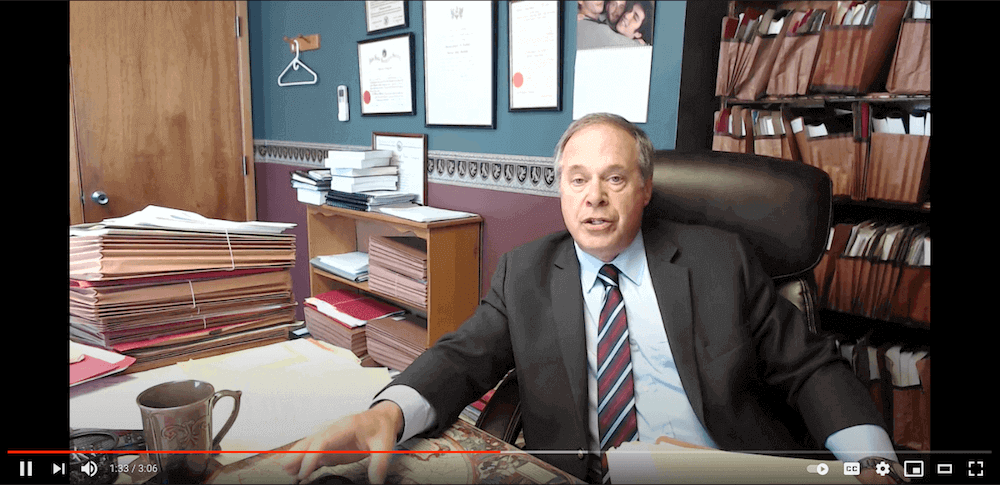
You can upload these to YouTube for maximum search and interest-based exposure while using YouTube to embed them onto your website to boost your website’s organic search visibility and enhance your user experience.
A best practice is to syndicate your video content onto other platforms (if social media is part of your marketing strategy), including Facebook, LinkedIn and Instagram.
9. Use PPC Ads to Get More Clients Quickly
Online ads, known as pay-per-click advertising have taken the web by storm. While other marketing tactics we’ve discussed can take time to get up and running before results can be seen, PPC ads can be set up relatively quickly and in some cases, can drive results the same day you launch an ads campaign.
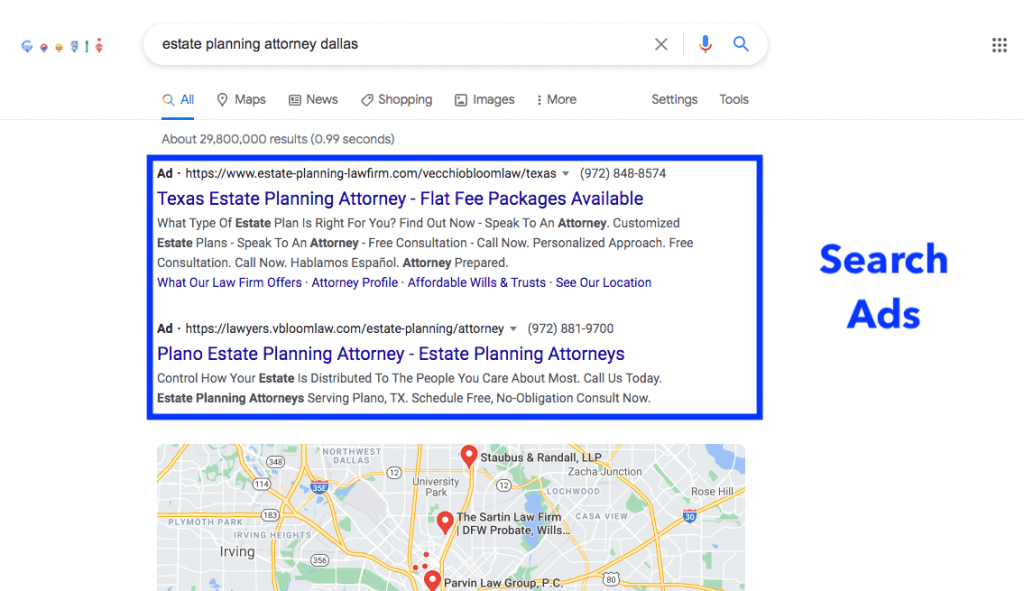
Popular platforms include both Google Ads, which allows you to advertise your law firm in search results above the organic (free) web listings. Bing search has a similar product through Microsoft ads, too.
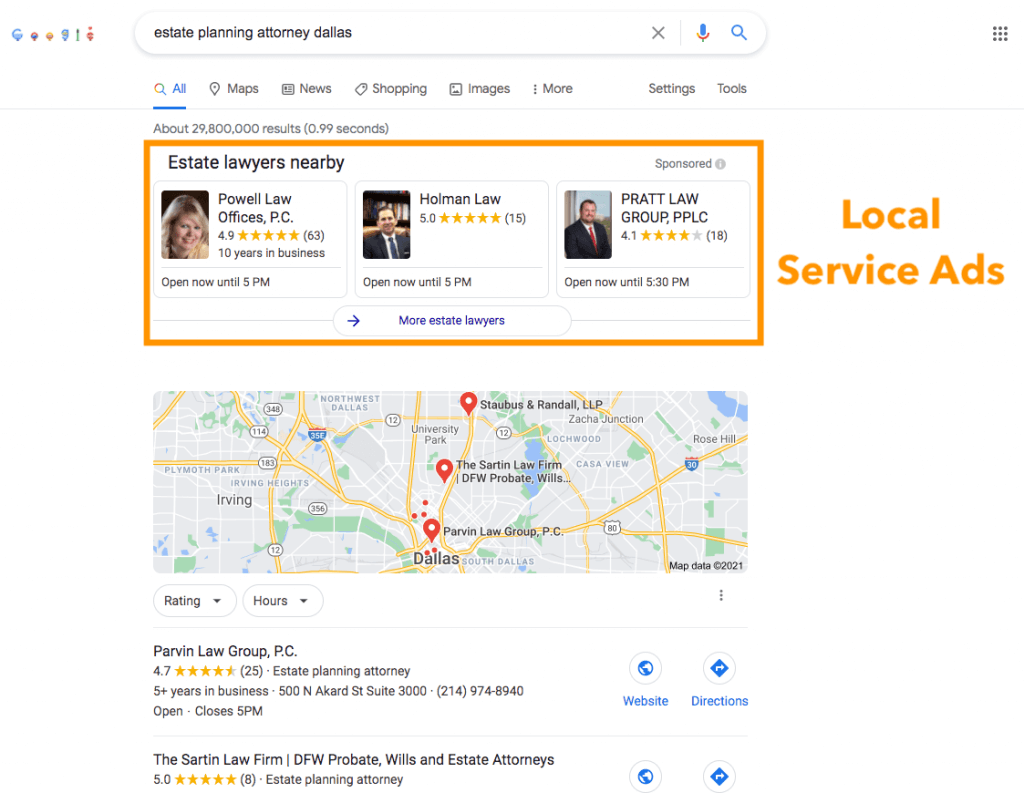
Google has now launched a new search ads product called Local Services Ads (LSAs), which works differently than conventional search ads. Instead of paying per click, you pay per lead. It sounds promising and while there is a charge dispute process for unqualified leads, it is not guaranteed your firm and Google will always agree on the definition of “qualified lead”.
Facebook ads are also a promising way to attract more clients in your local area and are an excellent way to promote your lead magnet to build your email list.
10. Improve Your Client Experience
Finally, one of the most important components to a marketing strategy is finding ways to build processes into your law firm that develops and improves the client experience. This is one of the most effective ways to drive more clients, build your firm’s reputation and reduce friction in the sales process (since referrals usually convert more easily than cold leads).
Some law firms send out a hand-written note with a box of cookies or muffins from a local bakery to their newly signed up clients as a part of their on-boarding process as a way of thanking them. Others compile all of the important information into a branded, presentation folder for their clients at the end of the process.
Doing pleasantly unexpected things that leave your clients with a personal, long-lasting impression can go a long way in terms of staying memorable and top-of-mind, driving word-of-mouth referrals as well as more online reviews and testimonials.


